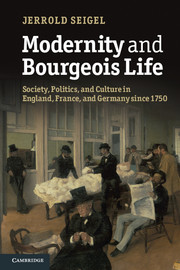 Modernity and Bourgeois Life
Modernity and Bourgeois Life Book contents
- Frontmatter
- Contents
- Illustrations
- Preface
- 1 Introduction: ends and means
- Part I Contours of modernity
- 3 Monarchical centralization, privilege, and conflict: France
- 4 Localism, state-building, and bürgerliche Gesellschaft: Germany
- 5 Modern industry, class, and party politics in nineteenth-century England
- 6 France and bourgeois France: from teleocracy to autonomy
- 7 One special path: modern industry, politics, and bourgeois life in Germany
- Part II Calculations and lifeworlds
- 9 Men and women
- 10 Bourgeois morals: from Victorianism to modern sexuality
- 11 Jews as bourgeois and network people
- Part III A culture of means
- 13 Bourgeois and others
- 14 Bourgeois life and the avant-garde
- 15 Conclusion
- Notes
- Index
11 - Jews as bourgeois and network people
Published online by Cambridge University Press: 05 June 2012
- Frontmatter
- Contents
- Illustrations
- Preface
- 1 Introduction: ends and means
- Part I Contours of modernity
- 3 Monarchical centralization, privilege, and conflict: France
- 4 Localism, state-building, and bürgerliche Gesellschaft: Germany
- 5 Modern industry, class, and party politics in nineteenth-century England
- 6 France and bourgeois France: from teleocracy to autonomy
- 7 One special path: modern industry, politics, and bourgeois life in Germany
- Part II Calculations and lifeworlds
- 9 Men and women
- 10 Bourgeois morals: from Victorianism to modern sexuality
- 11 Jews as bourgeois and network people
- Part III A culture of means
- 13 Bourgeois and others
- 14 Bourgeois life and the avant-garde
- 15 Conclusion
- Notes
- Index
Summary
Communities, networks, and capitalism
Of all the phenomena that call attention to the relations between modernity, bourgeois life, and the growing importance of extended networks and distant connections, none is more momentous and few more revealing than the role played by Jews in European history. That Jews have a singular connection to bourgeois life (despite the fact that many of them have been too poor to take much part in it), and to modernity (despite Jewish preservation of ancient traditions), is evident from the positions, actual and imagined, that many of them acquired between the eighteenth century and the twentieth, by the enmity that came to be focused on them, and finally by the fate to which they were subjected by German National Socialism. The outcome of this story lies beyond the scope of this book, but we cannot avoid trying to make sense of the relationship between Jews, modernity, and bourgeois life.
Jews have lived in Europe from ancient times, but have often been made to feel unwelcome there, repeatedly becoming objects of suspicion, hostility, persecution, violence, expulsions, exclusion from many occupations, and confinement in ghettoes. The instability such an existence imposed gave added importance to the ties Jews in particular countries felt and maintained with those in others, giving Jewish life an early and continuing reliance on extended chains of connection, and a cosmopolitan character unlike that of any other comparable population (I will come back to this point in a moment). These features of Jewish life, alongside differences in language, culture, belief, and the role attributed to them as deicides in Christian tradition, became motifs of the animosity directed against them, as rootless and detached from the rest of society, inhabiting a separate and private space of their own, and representing a form of life at odds with the one sanctioned by communal and religious authority. By the nineteenth century the most powerful briefs against Jews stressed what linked them to modernity’s most disruptive powers and impulses: on the one hand the economic and cultural transformations that threatened traditional life and its values; on the other the leftist radicalism that projected a different but equally challenging mutation.
- Type
- Chapter
- Information
- Modernity and Bourgeois LifeSociety, Politics, and Culture in England, France and Germany since 1750, pp. 376 - 410Publisher: Cambridge University PressPrint publication year: 2012


